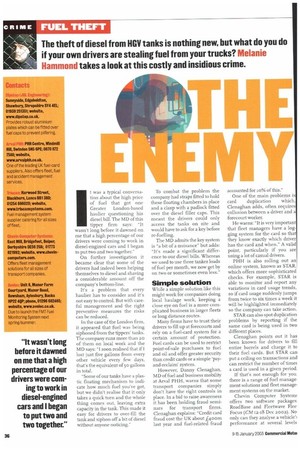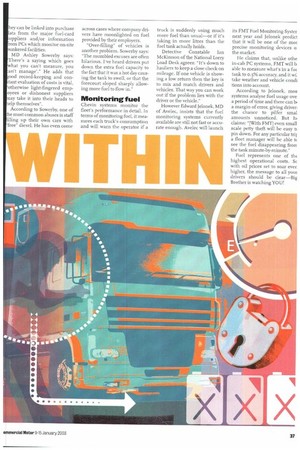The theft of diesel from HGV tanks is nothing new,
Page 36

Page 37

If you've noticed an error in this article please click here to report it so we can fix it.
but what do you do if your own drivers are stealing fuel from your trucks? Hammond takes a look at this costly and insidious crime.
1 t was a typical conversa
tion about the high price of fuel that got one Greater London-based haulier questioning his diesel bill. The MD of this tipper firm says: "It wasn't long before it dawned on me that a high percentage of our drivers were coming to work in diesel-engined cars and I began to put two and two together."
On further investigation it became clear that some of the drivers had indeed been helping themselves to diesel and shaving a considerable amount off the company's bottom-line.
It's a problem that every haulier has to consider and it's not easy to control. But with careful management and the right preventive measures the risks can be reduced.
In the case of the London firm, it appeared that fuel was being siphoned from the tippers' tanks. The company runs more than 20 of them on local work and the MD says: "I soon realised that if! lost just five gallons from every other vehicle every few days, that's the equivalent of5o gallons in total.
"Some of our tanks have a plastic floating mechanism to indicate how much fuel you've got, but we didn't realise that it only takes a quick turn and the whole thing comes out, leaving extra capacity in the tank. This made it easy for drivers to over-fill the tank and siphon off a bit of diesel without anyone noticing." To combat the problem the company had straps fitted to hold these floating chambers in place and a clasp with a padlock fitted over the diesel filler caps. This meant the drivers could only access the tanks on site and would have to ask for a key before re-fuelling.
The MD admits the key system is "a bit of a nuisance" but adds: it's made a significant difference to our diesel bills. Whereas we used to use three tanker loads of fuel per month, we now get by on two or sometimes even less."
Simple solution
While a simple solution like this might work for companies doing local haulage work, keeping a close eye on fuel is a more complicated business in larger fleets or long distance routes.
Many firms have to trust their drivers to fill up at forecourts and rely on a fuel-card system for a certain amount of protection. Fuel cards can be used to restrict point-of-sale purchases to fuel and oil and offer greater security than credit cards or a simple 'payand-reclaim' system.
However, Danny Clenaghan, MD of fuel and business mobility at Arval PHH, warns that some transport companies simply don't have the right controls in place. In a bid to raise awareness it has been holding fraud seminars for transport firms. Clenaghan explains: "Credit card fraud cost the UK about i400m last year and fuel-related fraud
accounted for io% of this."
One of the main problems is card duplication which Clenaghan adds, often requires collusion between a driver and forecourt worker.
He warns: "It is very important that fleet managers have a logging system for the card so that they know exactly which driver has the card and when." A valid point, particularly if you are using a lot of casual drivers.
PHH is also rolling out an online system, known as STAR,. which offers more sophisticated checks. For example, STAR is able to monitor and report any variations in card usage trends, so if card usage suddenly jumps from twice to six times a week it will be highlighted immediately so the company can take action.
STAR can also spot duplication problems by reporting if the same card is being used in two different places.
Clenaghan points out it has been known for drivers to fill entire barrels and charge it to their fuel cards. But STAR can put a ceiling on transactions and can restrict the number of times a card is used in a given period.
If that's not enough for you there is a range of fuel manage. ment solutions and fleet manage. ment systems on the market.
Chevin Computer System offers two software packages RoadBase and Fleetwave Flee. Focus (CM 12-18Dec 2002). No only can they analyse a vehicle' performance at several levels
ey can be linked into purchase ata from the major fuel-card uppliers and/or information rom PCs which monitor on-site tinkered facilities.
MD Ashley Sowerby says: There's a saying which goes what you can't measure, you an't manage'." He adds that ood record-keeping and contaut evaluation of costs is vital, 'otherwise light-fingered empoyees or dishonest suppliers ay take it into their heads to elp themselves".
According to Sowerby, one of e most common abuses is staff fling up their own cars with 'free" diesel. He has even come across cases where company drivers have moonlighted on fuel provided by their employers, "Over-filling" of vehicles is another problem. Sowerby says: "The mumbled excuses are often hilarious. I've heard drivers put down the extra fuel capacity to the fact that it was a hot day causing the tank to swell, or that the forecourt sloped sharply allowing more fuel to flow in."
Monitoring fuel
Chevin systems monitor the fleet's performance in detail. In terms of monitoring fuel, it measures each truck's consumption and will warn the operator if a truck is suddenly using much more fuel than usual—or if it's taking in more litres than the fuel tank actually holds.
Detective Constable Ian McKinnon of the National Lorry Load Desk agrees: "It's down to hauliers to keep a close check on mileage. If one vehicle is showing a low return then the key is to mix and match drivers and vehicles. That way you can work out if the problem lies with the driver or the vehicle."
However Edward Jelonek, MD of Avelec, insists that the fuel monitoring systems currently available are still not fast or accurate enough. Avelec will launch its FMT Fuel Monitoring Syster next year and Jelonek predict that it will be one of the moE precise monitoring devices o the market.
He claims that, unlike othe in-cab PC systems, FMT will b able to measure what's in a fut tank to 0.5% accuracy, and it WL take weather and vehicle condi tions into account.
According to Jelonek, mos systems analyse fuel usage ove a period of time and there can b. a margin of error, giving driver: the chance to pilfer smal amounts unnoticed. But ht claims: "[With EMT] even small scale petty theft will be easy tc pin down. For any particular MT a fleet manager will be able tc see the fuel disappearing fron the tank minute-by-minute."
Fuel represents one of tht highest operational costs, Sc with oil prices set to soar ever higher, the message to all youi drivers should be clear—Big Brother is watching YOU!
























































































































































